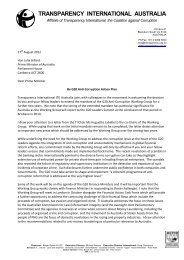'What works and why in community-based anti-corruption programs'
'What works and why in community-based anti-corruption programs'
'What works and why in community-based anti-corruption programs'
You also want an ePaper? Increase the reach of your titles
YUMPU automatically turns print PDFs into web optimized ePapers that Google loves.
What <strong>works</strong> <strong>and</strong> <strong>why</strong> <strong>in</strong> <strong>community</strong>-<strong>based</strong> <strong>anti</strong>-<strong>corruption</strong> programs4.4 SummaryThe context <strong>and</strong> environment of each program was unique, <strong>and</strong> on first glance, the differencesbetween <strong>in</strong>fluences on the programs seem stark. No two programs demonstrated the same set ofconditions or factors for success. Some programs were <strong>in</strong>fluenced by many factors, other programsappear to be driven by a few key factors.Across the case studies, <strong>in</strong>ternal factors appear to be more <strong>in</strong>fluential over the success of theprograms than the external factors. The process for design<strong>in</strong>g <strong>and</strong> implement<strong>in</strong>g the program, thepeople employed <strong>and</strong> engaged by the implement<strong>in</strong>g organisation or group, <strong>and</strong> the ability of theimplement<strong>in</strong>g organisation or group to engage with other stakeholders, especially governmentauthorities, was critical to the success of most programs. It is not surpris<strong>in</strong>g that the organisationsrunn<strong>in</strong>g successful programs aga<strong>in</strong>st <strong>corruption</strong> optimised their <strong>in</strong>ternal factors before their programwas launched.External conditions were important, even highly <strong>in</strong>fluential, but appear to have less of an impact on thesuccess of the programs than the <strong>in</strong>ternal factors. For most organisations, external factors were morelike dynamics or limitations that their programs needed to work with<strong>in</strong>. Successful programs weretherefore situated <strong>in</strong> a position that gave the implement<strong>in</strong>g organisation room to manoeuvre with<strong>in</strong> thelocal social, political <strong>and</strong> cultural context.In addition, external factors were fluid <strong>and</strong> susceptible to sudden change that was also out of theorganisations’ control. Programs needed to evolve to chang<strong>in</strong>g circumstances. As the local <strong>corruption</strong>situation improved or worsened, or external dynamics shifted, successful programs evolved <strong>and</strong>adapted to the new environment – for example the work of MKSS, Textbook Count <strong>and</strong> the LamonBay project changed <strong>and</strong> adapted to the shift<strong>in</strong>g external environment.The importance of external factors as factors for success should not be discounted <strong>in</strong> favour of a solefocus on the <strong>in</strong>ternal factors. Every program was affected by outside conditions. It was important thatorganisations understood <strong>and</strong> considered carefully the likely impact of external conditions on<strong>community</strong> programs.Two external factors were important for a majority of programs: ‘Different stakeholders recognise<strong>corruption</strong> as a problem’ or ‘<strong>community</strong> members are discuss<strong>in</strong>g or talk<strong>in</strong>g about <strong>corruption</strong>’ wereessential for nearly two thirds of the case studies. Other factors also exhibited a possible reciprocalrelationship for programs. For example, programs that did not depend on ‘political will for reform’ weredependent on the factor of ‘presence of vocal media’ – <strong>and</strong> vice versa.There were also un<strong>anti</strong>cipated catalysts, external factors that were difficult to predict <strong>and</strong> had beenrealised as facilitat<strong>in</strong>g success only <strong>in</strong> h<strong>in</strong>dsight. This was an external supporter offer<strong>in</strong>g unexpectedpublic endorsement of a program, or a crisis event that jolted people’s consciousness about<strong>corruption</strong>. Catalysts are difficult to cultivate <strong>and</strong> predict, so it is helpful to note that <strong>in</strong> no case studywas an unexpected catalyst the sole reason for a program’s success.This is the most significant result of this research – there was no s<strong>in</strong>gle condition, factor or catalystthat underp<strong>in</strong>ned the success of a <strong>community</strong> <strong>anti</strong>-<strong>corruption</strong> program. As shown <strong>in</strong> Table One(<strong>in</strong>ternal factors) <strong>and</strong> Table Two (external factors), every program was successful because of acomb<strong>in</strong>ation of factors, sometimes only a few, but often up to six or seven significant reasons.Overall only three factors appear to be universal <strong>and</strong> essential to success of all programs. First is the<strong>in</strong>ternal factor of determ<strong>in</strong><strong>in</strong>g a clear <strong>and</strong> def<strong>in</strong>ed focus <strong>and</strong> strategy for the program with <strong>in</strong>-builtflexibility, <strong>and</strong> second the human resources component – hav<strong>in</strong>g a skilled, competent team toimplement the program. Third, hav<strong>in</strong>g the trust of communities was also a universal reason forsuccess. This is a special factor, as it is both an <strong>in</strong>ternal <strong>and</strong> external factor. Organisations <strong>and</strong> groupsneed to look <strong>in</strong>wards <strong>and</strong> structure their processes for maximum participation with <strong>community</strong>members. However, trust must come from the external <strong>community</strong> towards the program <strong>and</strong> programimplementers.- 40 -




